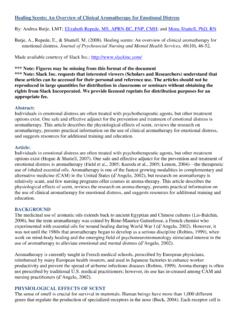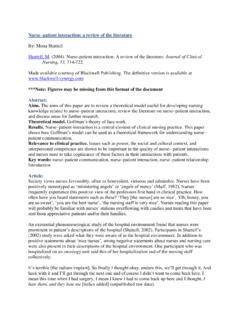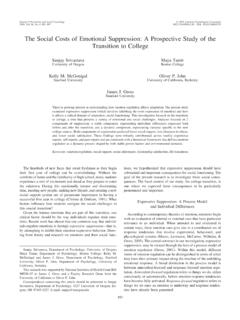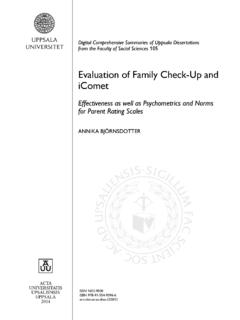Transcription of CLARKE, PHILIP BRANKER, Ph.D. The Relationship between ...
1 CLARKE, PHILIP BRANKER, The Relationship between wellness , emotion regulation , and Relapse in Adult Outpatient Substance Abuse Clients. (2012). Directed by Drs. Jane E. Myers and Todd F. Lewis. 265 pp. Relapse prevention is a critical factor in recovery from substance abuse problems (NIDA, 2009). Treatment has been shown to influence positive recovery trajectories, yet relapse is a considerable complication both during and after treatment (Doweiko, 2002;. Miller, Zweben, & Johnson, 2005). Identifying specific factors that can reduce relapse and improve the well-being of persons in recovery is a significant need. Based on the existing literature, holistic wellness and the ability to emotionally self-regulate may be powerful factors in decreasing the prevalence and severity of addiction relapse.
2 However, to date, no research has been conducted examining a holistic model of wellness as a predictor of relapse in addictions populations. The aspects of emotion regulation and emotion management strategies that affect relapse are not well understood. The purpose of this study was to address a significant gap in the substance abuse treatment literature by exploring the relationships among wellness , emotion regulation , and relapse. Correlation analyses yielded negative correlations between wellness factors and difficulties in emotion regulation , and wellness factors and relapse. Positive correlations were found between wellness and reappraisal, difficulties in emotion regulation and suppression, and difficulties in emotion regulation and relapse.
3 Logistic regression analyses indicated that Total wellness , suppression, Social Self wellness , and Physical Self wellness were predictive of whether or not participants relapsed. Total wellness , reappraisal, suppression, and difficulties in emotion regulation were predictive of total relapse days. Social Self and Physical Self wellness were related to decreased relapse days and Creative Self wellness was associated with increases in relapse days. The hypothesis which stated that difficulties in emotion regulation and emotion regulation strategies would mediate the Relationship between wellness and relapse and wellness and total relapse days was not supported. Finally, Total wellness , difficulties in emotion regulation , and emotion regulation strategies explained variance in total relapse days above and beyond variance accounted for by socio-demographic variables.
4 Future research should further explore the relationships between wellness , emotion regulation , and relapse by examining a variety of substance use behaviors as outcomes, utilizing additional measures of emotion regulation , and incorporating longitudinal research designs. THE Relationship between wellness , emotion regulation , AND RELAPSE IN ADULT OUTPATIENT. SUBSTANCE ABUSE CLIENTS. by PHILIP Branker Clarke A Dissertation Submitted to the Faculty of The Graduate School at The University of North Carolina at Greensboro in Partial Fulfillment of the Requirements for the Degree Doctor of Philosophy Greensboro 2012. Approved by Dr. Jane E. Myers Committee Co-Chair Dr. Todd F. Lewis Committee Co-Chair 2012 PHILIP Branker Clarke APPROVAL PAGE.
5 This dissertation has been approved by the following committee of the Faculty of The Graduate School at The University of North Carolina at Greensboro. Committee Co-Chairs Dr. Jane E. Myers Dr. Todd F. Lewis Committee Members Dr. Robert A. Henson Dr. Christopher N. Poulos February 2, 2012. Date of Acceptance by Committee February 2, 2012. Date of Final Oral Examination ii ACKNOWLEDGMENTS. The process of completing this dissertation has been one of great struggle, sacrifice, and growth. I wish to express my profound gratitude to those in my life who supported me in different ways. First I would like to thank the UNCG counseling department family. Since starting the master's program, I have always felt supported by all the faculty and peers in this fine program.
6 To my committee I cannot thank you enough. Dr. Poulos your help in this process has been invaluable. You were always available to talk despite an incredibly busy schedule and I will never forget some of our wonderful conversations, your kind words, and watching you captivate students in every class you taught. Special thanks to Dr. Henson for remaining on my committee after moving to teach at another university. You always made time to help me operationalize my statistical brainstorms, even drawing equations on the whiteboard to clarify the road map of this dissertation. I am indebted to you, Dr. Lewis, for all the help and time you have spent with me in the dissertation process. We met on weekdays and weekends, at coffee shops, deli's, the university cafeteria, your office, or wherever we could get work done.
7 You were willing to go the extra mile with me on this dissertation at every single turn. Dr. Myers you have been the consummate mentor for me throughout the master's program, doctoral program, and the dissertation process. You believed in me from the very start and have pushed me far past where I thought I could go as a leader, scholar, and human being. You have always valued me as a person and respected my life iii decisions and unique quirks. It is bittersweet to end this chapter as your student, but I am looking forward to continued mentorship from you as your colleague. I owe a tremendous debt of gratitude to the treatment centers, clinical supervisors and directors who were so open and receptive to me disseminating my survey at their sites.
8 At every site, I had the good fortune of having incredibly rich conversations about addiction, recovery, counseling, and life in general. Thanks to the individuals who took part in my survey and to the clients I have had the pleasure of working with. I am inspired by your courage. Jaid I could not have possibly gotten through this doctoral program without your friendship and support. No matter how busy life is, we have always been able to make time for fun, laughter, and tears. Sejal I feel like I've known you my whole life. That is how well we get along. Thanks for always helping me see the best in myself and for so many fun memories. Amanda you have been the best friend and writing partner anyone could have.
9 I love how our conversations can range from reflections on life to research methodology. Thanks to the Tenacious Ten Sejal, Steve, Denisha, Sarah, Chris, Eli, Lewis, Suzie, and Jennifer. I have so many special memories with each of you and of our whole group. I feel fortunate to have been around such amazing individuals. You will forever be family to me. Clark you are an honorary CED student. Thanks for your support. Robert your help has been invaluable. Last and definitely not least, I want to thank my family. My loving parents you are my two biggest hero's in life. I could not possibly have parents who are any more iv supportive, fun to be around, and rich in wisdom. You have been my greatest cheerleaders since the day I was born.
10 I always feel your presence, cheering me on as I navigate my way through the ups and downs of life. I love you more than words can ever say. Jessica you are one of the greatest inspirations in my life. You are one of the hardest working and loving people I. know. I'm so honored to be your brother. You have unconditionally supported me in my life and have been the best friend a person could have. Mom, Dad, and Sis we have shared so many wonderful experiences together and I am excited about the memories to come. v TABLE OF CONTENTS. Page LIST OF TABLES .. ix CHAPTER. I. INTRODUCTION ..1. Substance Abuse ..4. Relapse ..5. wellness ..8. emotion regulation ..10. Statement of the Problem ..12. Purpose of the Study.



















